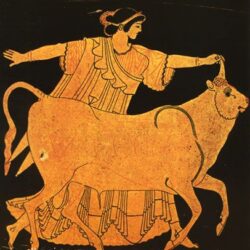Covering oneself was a traditional practice within Algerian culture for women. This was until the colonists arrived and began a campaign of unveiling. It gave a seeming sense of confidence, as described on page 52 of Frantz Fanon’s book, but did not come without judgement of those around them. The weaponization of the veil and transportation of weaponry gave rise to a whole new meaning of this tradition. Resistance to this by the women meant self-actualization but does this resistance to materialization gain ground in the battle for equality? Or were these women always going to be scrutinized based on resistance to traditional values?

Cruel Star
“I have often thought that many of our people turned to Communism not so much in revolt against the existing political system, but out of sheer despair over human nature which showed itself at its very worst after the war. Since it is impossible for men to give up on mankind, they blame the social order in which they live; they condemn the human condition.”
Kovaly, 53
I have selected this quote from one of the first pages of this assigned reading because I want to unpack it with the class. I am curious to hear everyone’s analysis of this selected text and I want to know if you personally agree with the last sentence.
The Cult of the Individual
“Stalin was a very distrustful man, sickly suspicious. He could look at a man and say: “Why are your eyes so shifty today?” or “Why are you turning so much today and avoiding to look me directly in the eyes?” The sickly suspicion created in him a general distrust. Everywhere and in everything he saw “enemies”, “two-facers” and “spies”.”
I was wondering what our class thinks about this specific quote. Do you think the events that were taking place during this time period forced Stalin to not trust anyone or anything? Or do you think that he naturally just thinks this way?
Stalin’s Methods
In the speech “The Cult of the Individual”, Nikita Krushchev discusses Stalin’s shortcomings and his creation of a cult-like following by discouraging individualism and promoting his supremacy. Krushchev mentioned that Stalin “used extreme methods and mass repressions” to solidify the Union’s socialist state (Krushchev). For the midterm assignment, I researched Stalin’s mannerisms to understand how the Soviet system functioned under his rule. Although I agree that Stalin committed horrible atrocities in the way of human rights and individual liberties, some Soviet citizens seemed to benefit under his policies. Do you think that Stalin’s extreme methods were necessary to jump-start the economy and further industrialize the Soviet Union? Objectively speaking, was limiting individuality necessary to create a socialist state?
The Secret Speech
The “Secret Speech” was a very informative and interesting read. Khrushchev basically criticized every little thing Stalin did while in power. It was interesting to hear Khrushchev’s feelings on Stalin and his Cult of personality. It makes perfect sense to me why the title of today’s class is De-Stalinization: taking away everything Stalin put in place and made a mess of and Khrushchev’s speech did exactly that. I am sure a lot of people are already aware of the atrocities Stalin committed throughout his entire life, but the speech really convinced me to despise him. The basis of Stalin’s Cult of Personality was to reinvent the way Stalin was viewed into a God-Like figure and to follow in the footsteps of his predecessor Lenin. It turns out though, Stalin was nothing like Lenin and if anything went against everything he stood for. While reading I kept wondering, if he was as bad as everyone said he was then how did he reach such a powerful position. It seemed to me that there were warning signs that were dismissed. My question was addressed later in the speech as Stalin first seemed to follow the ideals set in place by Lenin then started to transition into his own. “Some comrades may ask us: Where were the members of the politburo? Why did they not assert themselves against the cult of the individual in time? And why is this being done only now? First of all, members of the politburo viewed these matters in a different way at different times. Initially, many backed Stalin actively because he was one of the strongest Marxists and his logic, his strength and his will greatly influenced party work. After Lenin’s death, especially during the first years, Stalin actively fought for Leninism against the enemies of Leninist theory and against those who deviated. At that time the party had to fight those who tried to lead the country away from the correct Leninist path”(Khrushchev, 1956). Like I mentioned previously, this speech did a great job of further blackening the character of Stalin, but was it too much? I’m not trying to defend any of the actions of Stalin, but this speech was made 3 years after his death so it makes me wonder how big of an issue it was at the time.
*Fun Fact- Comrade(s) was said 16 times throughout the course of the speech!!
Women vs. History
I love the way Beauvoir articulates the relationship between women and history: “it is not women’s inferiority that has determined their historical insignificance; it is their historical insignificance that has doomed them to inferiority” (Beauvoir 151). I think examining the role of this collective male-written and male-dominated history is really crucial to understanding not only the peculiar subjectivity of historical narratives and “truths” but also how the past continues extending into the present. A concrete tradition of male glory and power, despite the strides made in terms of gender equality, seems like it’s going to win out every time over women’s vaguer and less tangible role in history, especially when the notion of gender equality is more conceptualized than it is fulfilled or realized. Because of the extent of this history, will this cycle ever be broken?
The concept of the “other”
Upon reading the introduction of The Second Sex by Simone de Beauvoir, the concept of the other caught my attention. It would appear that when we “other” (de Beauvoir 6) something, we are essentially distinguishing it. That which is designated as the “other” (de Beauvoir 6) is set apart from what is correct, and often considered a deviation from the norm. Othering has a wide spectrum of severity, and can take many different forms. On the extreme end, it can be anti-semitics looking at Jewish people as sub-human. On the lighter end, it can be natives to a particular country who view foreigners as being strange. I wonder, why do we as humans like to “other” people so much? Why do we always like to set people apart as being odd, strange, deviants, or in the worse cases inferior? There seems to be a theme of always designating a certain demographic to be correct or the best.
Alterity
The introduction of Simone de Beauvoir’s talks of the individual opportunity that women seek if they truly want to be seen as their own person. She brings up the idea that a woman is not born into the stereotype but molded into what history expects a woman to be. While change is hard and many studies suggest that we are still not equal, she suggests that the process starts with a mindset. So I raise the question that if the peoples mindsets are historically set in the wrong place, would that be more of a hinderance of change over a man expressing his superiority?
The Sinews of Peace
Churchill gave his Iron Curtin speech not long after the end of World War two and Not long before the beginning of the Cold War. He mentions the power hungry countries that lust for control and “the fruits of war” (Churchill, web). I find it interesting to think about the perspective at which he speaks. He talks as we do in class, from one perspective. He advises based on the democratic ideals which he believes in but allows no room for variance. While democracy is good from our point of view as well as his, is a world without variance a totally good thing? Could he be wrong in saying that the prevention of war is based on the expansion of freedom to people and the spread of democracy?
